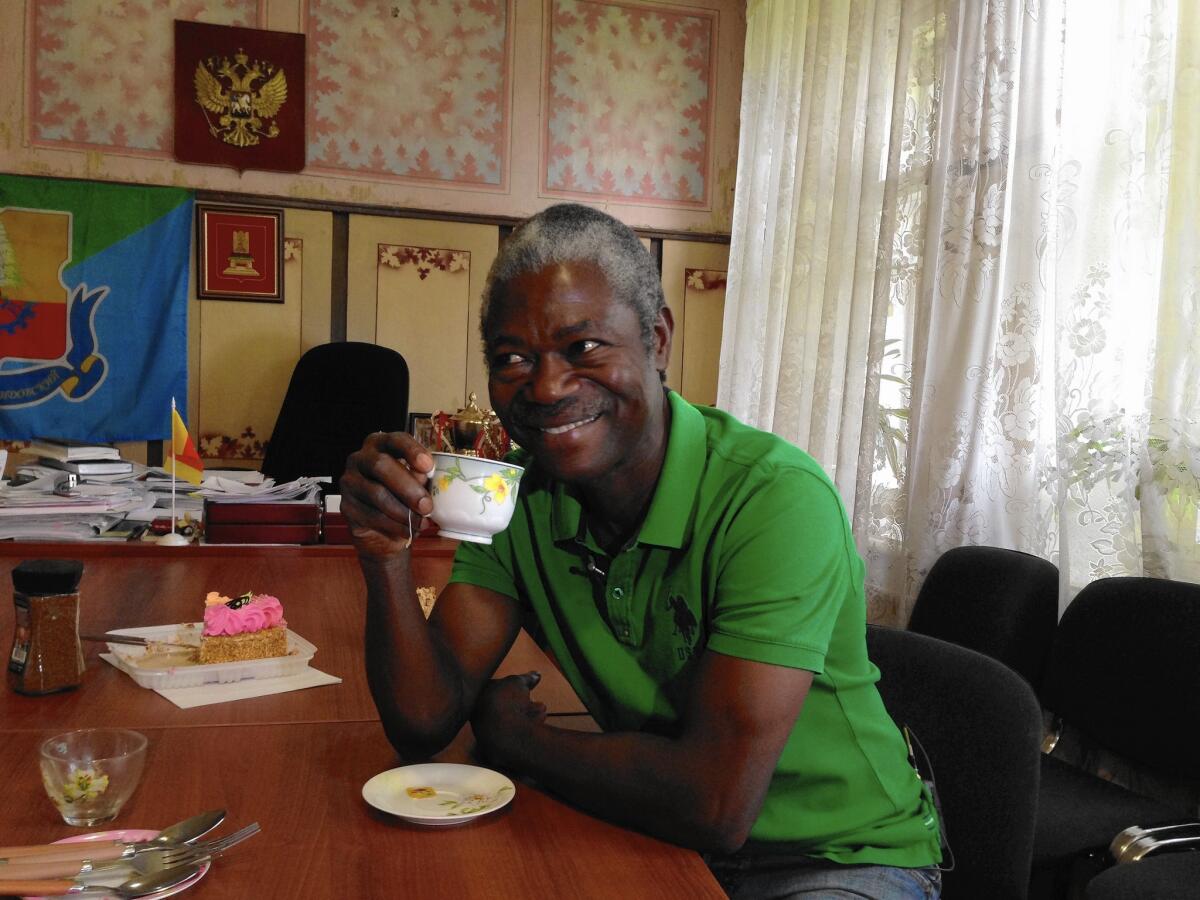African Russian official has turned locals’ suspicion to admiration

Reporting from Novozavidovsky, Russia — The stares that greeted Jean Gregoire Sagbo when he first arrived in the Soviet Union from Benin in the early 1980s were sometimes accompanied by insults.
Today the gestures are warm and welcoming, at least in this rural community where Sagbo made history four years ago by becoming the first black person elected to office in Russia.
With Sagbo now into the final months of a five-year town council term, his allure does not appear to have faded in Novozavidovsky, about 75 miles northwest of Moscow. Instead, he and many residents believe his time in office has helped improve the negative attitude some Russians have about Africans and dispel a widespread belief that many Russians don’t like black people.
“I think people can differentiate between bad and good,” Sagbo, 60, said over a cup of tea inside his small office at the town’s dilapidated municipal building. “People believe in me. They know I will try to solve their problems.”
“It doesn’t matter that he’s black; all people are the same,” said Constantine Morozov, 41, a carpenter, who grew up in the 8,000-person community. “What matters is that he’s a good person. He helps everyone and he has cleaned up the town.”
Sagbo defeated five opponents for the town council post. He won 39.9% of the vote, with the runner-up receiving about half that.
Sagbo said some countrymen have compared him to President Obama. But he no longer wants them to do that because Obama’s approval ratings have dropped markedly in Russia because of heightened tension between Moscow and Washington.
“Earlier when people called me Obama, it was prestigious, a compliment,” Sagbo said. “Now I consider it an insult.”
A slender man with salt-and-pepper hair and a predisposition to cry as easily as he laughs, Sagbo said his mission has been to restore trust in civic leadership by “being honest.” Some residents wonder why Sagbo is so determined to serve their interests and help them when his position is unpaid.
“I’m not about money,” said Sagbo, who, with his Russian-born wife, Svetlana, earns a living selling real estate and reselling shoes and clothes bought wholesale. “People look at how you behave.”
Sagbo has sought to have the town’s streets paved — asphalt is due to cover the dirt-packed streets this year — and he has organized garbage cleanups and helped restore heat and hot water to some of the town’s older homes and rustic cottages. He serves as a liaison between the community and regional officials who can authorize spending on such projects.
Businesswoman Svetlana Bokova, who ran against Sagbo but now supports him, praises his efforts to encourage residents to steer clear of alcohol and drugs. At times, he has even escorted young residents with addiction problems to treatment centers in Moscow.
“In general, the population has started to live more nobly,” Bokova said.
“Everyone knows the name of Jean Sagbo,” said Anastasia Vasileva, deputy head of the Novozavidovsky settlement administration. “My grandmother doesn’t even know his position, but she knows there is a black foreigner who helps and cares about people.”
Sagbo, a onetime socialist, came to what was then the Soviet Union in 1982 to study business and economics, with the aim of returning home to help develop his impoverished West African nation.
But he quickly became disillusioned with its claims of being a socialist utopia.
He and Svetlana, whom he met at the institute where they were studying and married in 1984, also suffered from prejudice against their interracial relationship.
She went with Sagbo to Benin when he returned in 1986, but he was immediately jailed, charged by Beninese leaders with having spread anti-socialist propaganda while in the Soviet Union. His ankles still bear deep grooves caused by wearing iron shackles for months.
Sagbo’s eyes well with tears as he tells of his wife’s forced return to the Soviet Union without him, but with their first child.
After escaping from prison, he returned to the Soviet Union in 1989 to reunite with his family. The couple had a second son in 1996.
Novozavidovsky was not always hospitable. Sagbo was angered when his sons were bullied on the street.
“I would fight all the time,” Sagbo said. “But I realized that these people were just drunks and tramps.”
The head of the town council encouraged Sagbo to run for office in 2010, and he decided to channel his energy into helping the community in order to earn more respect.
Today as he moves around town people wave and call out his name. They often stop to greet him and chat. He responds in fluent French-accented Russian, delivered in a rapid-fire tenor that requires a trained ear.
Aside from grumbles about the slow pace of road repairs, it’s hard to find public critics of Sagbo, who said he has not yet decided whether to seek reelection this year.
“We have only good words for him,” said Ivan Ivanovich Goroditsev, 70, a longtime resident who raises horses.
Yulia Razheva, 40, concurred. “He’s honest, friendly and caring,” she said. “We consider him one of us.”
This report was funded by a grant from the International Center for Journalists.
More to Read
Sign up for Essential California
The most important California stories and recommendations in your inbox every morning.
You may occasionally receive promotional content from the Los Angeles Times.











